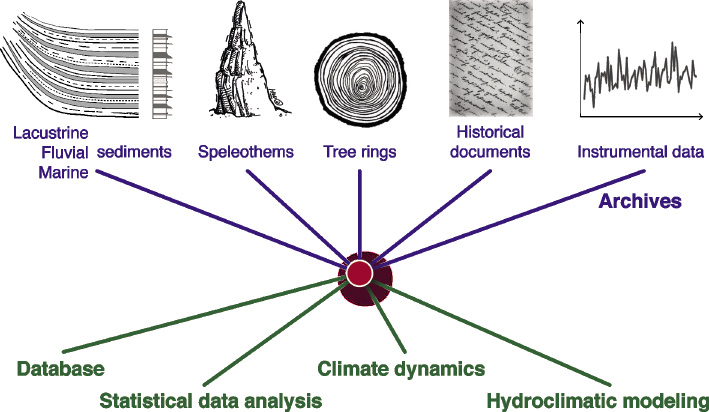- Home
- Publications
- PAGES Magazine
- New PAGES Working Group On Floods
New PAGES working group on floods
Wilhelm B, Wirth SB & Ballesteros-Canovas JA
Past Global Changes Magazine
24(1)
28
2016
Bruno Wilhelm1, S. B. Wirth2 and J. A. Ballesteros-Canovas3
Inland floods are among the most destructive natural hazards causing widespread loss of life, damage to infrastructure and economic deprivation. Robust knowledge about their future trends is therefore crucial for the sustainable development of societies worldwide. Ongoing climate warming is expected to lead to an intensification of the hydrological cycle and to a modification of the frequency and magnitude of hydro-meteorological extreme events. However, climatic projections for the future occurrence of precipitation extremes are still uncertain. The reason for this challenge is primarily the complexity of the variation in precipitation patterns at a regional scale and a limited temporal and spatial coverage of instrumental data capturing precipitation extremes and floods.
Records of past floods from lacustrine, fluvial and marine sediments, tree rings, speleothems, and historical documents provide a comprehensive overview of the variability of floods during warm and cool climates of the past. With the help of these paleo-flood records, we can significantly improve our understanding of the physical processes controlling the occurrence and magnitude of floods under varying past, present and near future climate states.
Therefore, bringing together researchers from the growing community investigating past flood events worldwide is timely. A survey conducted in June 2015 by Wilhelm and Wirth, with support from PAGES, confirmed the need and interest in a Floods Working Group. The objective is to coordinate and synthesize results on the natural variability of floods under different climate conditions and in different regions of the world, plus offer an ideal platform to promote collaboration.
The leaders and the scientific committee defined four major goals for the first three-year period of the working group:
(i) Share best practice of methodologies used by the various research communities working with sediment records, tree rings, speleothems, instrumental data and more. The objective is to improve the quality of the flood records and to reduce uncertainties, for example in the detection of events and in the dating precision.
(ii) Intensify efforts for determining the magnitude of past floods reconstructed from natural archives via calibration with historical and instrumental data. Information on past flood magnitudes will highlight the importance of flood reconstructions for stakeholders and future flood-risk estimations.
(iii) Establish a database of published datasets on past floods. The goal of this open-access database will be to improve the visibility of existing paleo-flood data and to enable their intercomparison.
(iv) Test and identify optimal statistical tools for the analysis of flood frequency, occurrence of extremes, and the comparison of datasets.
A very important goal of the Floods Working Group during this first phase is also to promote interdisciplinary collaboration and discussion between flood scientists as well as specialists in the fields of hydrology, statistics, climate dynamics and modeling. This network will become particularly important to examine and model atmospheric processes and hydrological conditions leading to extreme floods.
We expect important links with the PAGES-endorsed Varves Working Group (pastglobalchanges.org/science/end-aff/varves-wg/intro), since varved lake sediments provide high-resolution and well-dated flood records. We also anticipate strong links with the PAGES 2k Network (pastglobalchanges.org/2k) as the density of flood data is high for the past 2000 years.
The Floods Working Group met for the first time at the “Cross Community workshop on past flood variability” in Grenoble, France, 27-30 June 2016. This workshop was held to gain an overview of the different kinds of flood archives and flood datasets that are available. Another key focus topic was the launch and management of the database, and to discuss visions and ideas of the participants. A report on this meeting will be published in the next issue of the PAGES Magazine.
affiliations
1Laboratoire d'Etudes des Transferts en Hydrologie et Environnement, University Grenoble Alpes, France
2Centre for Hydrogeology and Geothermics, University of Neuchâtel, Switzerland
3Dendrolab.ch, University of Bern, Switerland
contact
Bruno Wilhelm: bruno.wilhelm ujf-grenoble.fr (bruno[dot]wilhelm[at]ujf-grenoble[dot]fr)
ujf-grenoble.fr (bruno[dot]wilhelm[at]ujf-grenoble[dot]fr)

